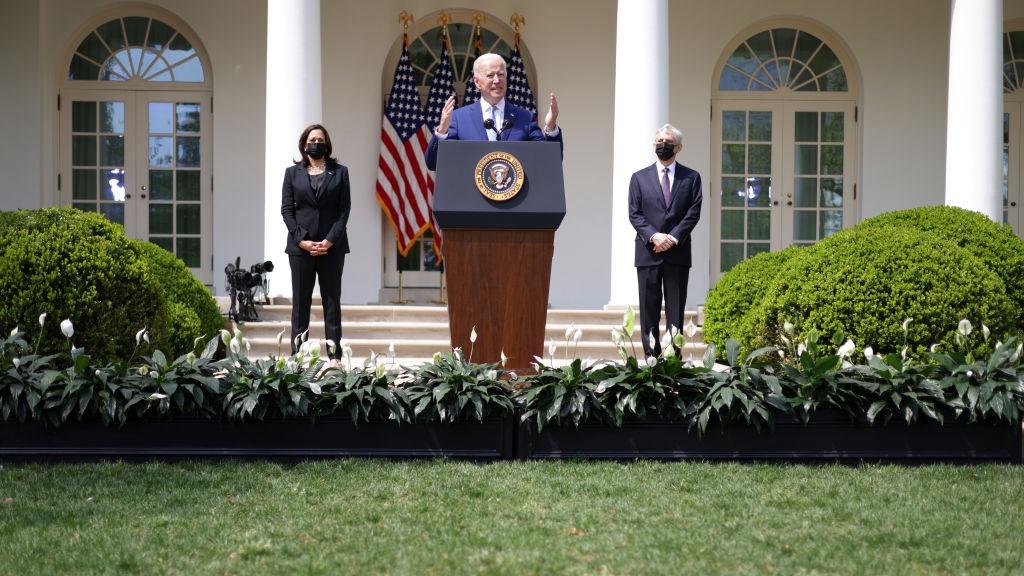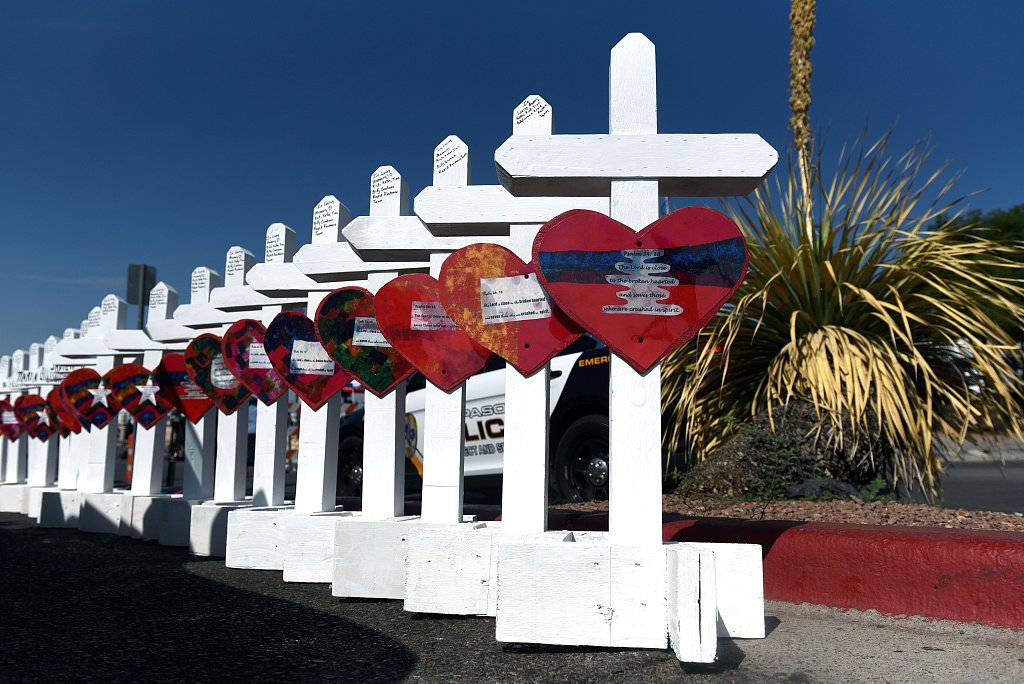Editor's note: Haider Rifaat is a writer for the South China Morning Post, Arabian Moda magazine, Good Times magazine and OK! Pakistan. The article reflects the author's opinions, and not necessarily the views of CGTN.
Besides combating the COVID-19 pandemic, the U.S. is also fighting against two re-emerging epidemics: the rise of racism and gun violence. The messaging of the latter issue often loses its importance in terms of dialogue, resistance from powerful organizations like the National Rifle Association (NRA) and party politics. It is well-founded that the NRA has firmly stood in the way of past administrations from enacting stringent gun control measures and banning of certain firearms. According to the Washington Post, gun sales increased by 80 percent in January following the Capitol Hill Riots. At least 2 million guns were purchased during this month alone.
U.S. President Joe Biden recently announced an executive action that aims to curtail gun violence in America. "Nothing I am about to recommend, in any way, impinges on the Second Amendment. They are phony, arguments suggesting that these are Second Amendment rights at stake from what we are talking about," Biden addressed in his latest speech.
"Gun violence in this country is an epidemic, and it's an international embarrassment," he went on to add. Mass shootings are magnifying this year in the United States. The most recent mass shooting in Bryan, Texas, which occurred only hours after the president's speech, left one dead and five injured. This is the eighth overall mass shooting the state of Texas has recorded since 2010.

U.S. President Joe Biden speaks as Vice President Kamala Harris (L) and Attorney General Merrick Garland listen during an event on gun control in the Rose Garden at the White House in Washington, D.C., April 8, 2021. /Getty
U.S. President Joe Biden speaks as Vice President Kamala Harris (L) and Attorney General Merrick Garland listen during an event on gun control in the Rose Garden at the White House in Washington, D.C., April 8, 2021. /Getty
Biden is of the opinion that there is much more that the U.S. Congress can do to help curb mass shootings. Part of what Biden suggests in this executive action is to thoroughly review federal policy on ghost guns – firearms that have no serial numbers on them and are usually self-assembled. Though this tactic could work, it is not the stealthiest solution that America demands. This effort would not impede future mass shooters unless a more elaborate framework is designed to address how mass shooters gain access to guns despite background checks.
The Biden administration would likely fall on its face with a frail executive action on gun control that would achieve nothing of importance, really.
Recent history gives insight into similar executive actions put in place by former President Barack Obama in 2016. It is ironic that Obama remained mum about imposing gun control as a result of mass shootings that occurred during his initial run as president. These include the infamous first Fort Hood; Tucson, Arizona; and Wisconsin Sikh Temple and Aurora, Colorado, movie theater shootings held in 2009, 2011 and 2012 respectively.

Memorial crosses for the victims of mass shooting at a Walmart store in El Paso, Texas, U.S., August 5, 2019. /VCG
Memorial crosses for the victims of mass shooting at a Walmart store in El Paso, Texas, U.S., August 5, 2019. /VCG
It wasn't until Sandy Hook that Obama mustered the courage to ban assault weapons and overcome gaps in background checks in 2013. However, his efforts proved futile as the U.S. is plunged deeper into gun violence eight years later. Not to forego how the Republican Party made concerted efforts in the past to thwart Obama from enacting stricter gun control measures.
Despite many advocacy groups and think tanks that support gun control such as the Coalition to Stop Gun Violence, Brady Campaign to Stop Gun Violence, Third Way and the student-led Never Again MSD, mass shootings continue to haunt an average American household. It is not that the Second Amendment of the U.S. Constitution is at fault here. It is the dysfunctional gun purchase system that gives individuals suffering from personal problems and mental illnesses a pass to register for firearms. Therefore, background checks for every American need to be a lot more thorough, not precise.
Partly why the U.S. is witnessing an upward trend in mass shootings is on account of COVID-19. The pandemic has laid bare social inequalities, rising unemployment rates and depression. These conditions would incentivize potential criminals to commit shootings more often than usual.
Even the politicization of gun violence is inhuman. It is hardline Republicans and gun rights organizations like Gun Owners of America and the Second Amendment Foundation that are truly problematic for America.
They have stood in the way of past administrations from passing legislative action that would achieve gun control without vetoing Second Amendment rights of an average American.
Organizations including the NRA and its affiliates need to understand that if America is to move forward from the recurring gun control dialogue. It is more about finding common ground on gun violence and devising ways to prevent future mass shootings. There needs to be a better check and balance system and a set criteria in place for people who are qualified to own guns. At present, the solution lies in being proactive and action-oriented rather than simply lecturing Americans on gun violence.
(If you want to contribute and have specific expertise, please contact us at opinions@cgtn.com.)

